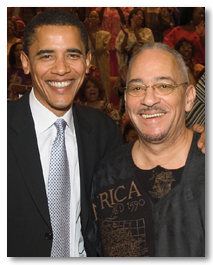Standing by his church
- FATHER RAYMOND J. DE SOUZA
Senator Barack Obama really has only one subject on which he has something important to say race in America. But what extraordinary things he does say on that one subject, and how marvelously he says them.
 |
In his Philadelphia speech on Tuesday, he spoke about his pastor, and had an important lesson for the church.
Heretofore, Obamas speeches have been near-parodies of uplifting but empty rhetoric. He is for hope not despair, the future not the past, harmony not strife, peace not war, reconciliation not conflict. I dont believe he ever said he was in favour of good, not evil, but he came pretty close. The soufflé, rising on nothing but hot air, has been the suitable image several commentators have employed to describe him.
Yet on the subject of race, he is substantive. A black man abandoned in infancy by his black father and raised in his white mothers family, Obamas most sustained intellectual attention has not been given to politics or philosophy, but to racial identity. His first book, Dreams From My Father: A Story of Race and Inheritance, was a beautiful memoir exploring, above all, questions of race. And the powerful attractiveness of his campaign is that he might bring a measure of those explorations to the American inheritance of racial division.
In Philadelphia, Obama sought to explain, but not excuse, his pastors comments. In refusing to cast aside the Reverend Jeremiah Wright, Obama made an important point about what it means to belong to a community, and to belong to a church.
He contains within him the contradictions the good and the bad of the community that he has served diligently for so many years, Obama said of Wright. I can no more disown him than I can disown the black community. Later the same day, speaking to ABC News, Obama added: You certainly dont disown the church.
That alone was a refreshing contrast from the usual campaign practice, in which even long-time friends are casually cast aside if they become a political liability. Obama offers a stark contrast to the Clintons, who do not think twice about jettisoning either personnel or principle in their lifelong pursuit of power.
Obamas point is that he belongs to a certain community, to a certain church, and he carries with him both their strengths and weaknesses. Many critics have said that while you dont choose your family, you do choose your church, and so it says something about Obama that he chose the Reverend Wrights congregation. Yet even in black America, where the pastor defines to a great degree his congregation, the church is more than its pastor.
In choosing to condemn the words, but not condemn the man, Obama may have exposed himself to political danger. Yet it showed a deeper understanding of the church, and not only the black church. |
Indeed, at times the congregation is what it is in spite of its pastor. The church is the body of Christ, not a mere collection of likeminded souls, and to belong to Him means belonging, in part, to the other sinners who He also claims as His own.
In choosing to condemn the words, but not condemn the man, Obama may have exposed himself to political danger. Yet it showed a deeper understanding of the church, and not only the black church. If we are bold enough to claim for ourselves some share in the merit of the saints, we too are implicated in the shame of the sinners. Sin ought to have no friend in the church including the sin of prejudice and hatred but if sinners have no friend in the church, then it will be a very empty place indeed.
In the Reverend Wright controversy, Obama faced a choice between the politically expedient, and remaining faithful to the black community and the black church. To be faithful to the church does not mean accepting her only as she is, for she is always in need of reform. To be faithful to the church is to help her to become what she should be.
Whatever the political fallout, Obama has given the church a good lesson. Too often, within the church itself, both Protestant and Catholic, those who betray their mission are flung out, hopefully never to be heard from again. To have them around would be embarrassing. We prefer to hang with the saints, and hang the sinners out to dry.
That might be good politics, but it is not good theology. Barack Obama long ago decided that he belonged to the black community despite his white upbringing, and that at the heart of the black community was the black church. It was there that he learned about Jesus Christ and came to faith. It has sustained him since and, no doubt, helped his political career. He has stood with it in good times; it does credit to him that he still stands firm now.
 This is J. Fraser Field, Founder of CERC. I hope you appreciated this piece. We curate these articles especially for believers like you.
This is J. Fraser Field, Founder of CERC. I hope you appreciated this piece. We curate these articles especially for believers like you.
Please show your appreciation by making a $3 donation. CERC is entirely reader supported.

Acknowledgement
Father Raymond J. de Souza, "Standing by his church." National Post, (Canada) March 20, 2008.
Reprinted with permission of the National Post and Fr. de Souza.
image: Trinity United Church of Christ/The New York Times
The Author
Father Raymond J. de Souza is the founding editor of Convivium magazine.
Copyright © 2008 National Post

